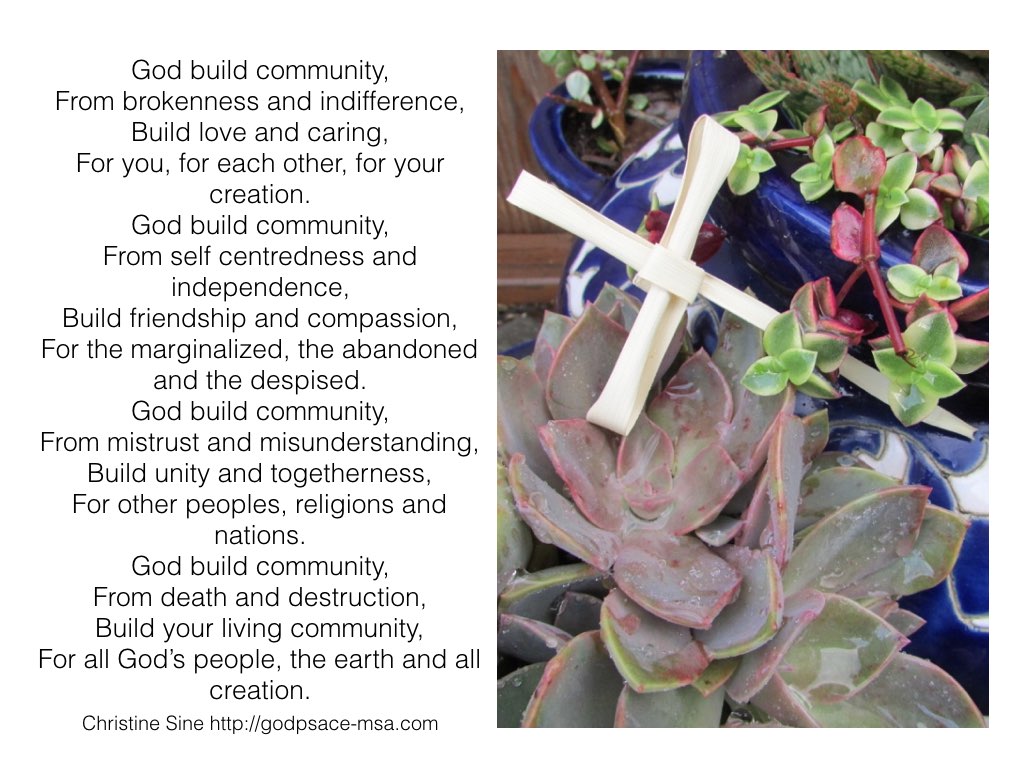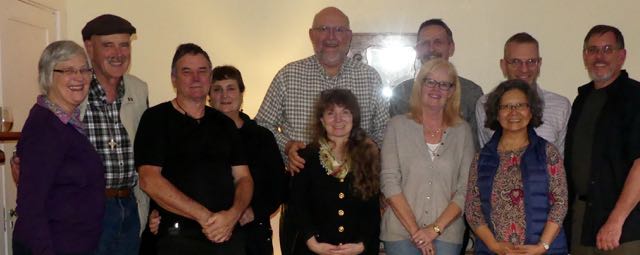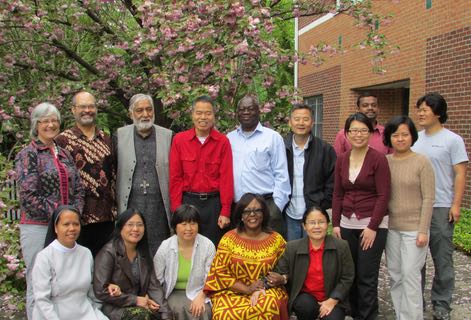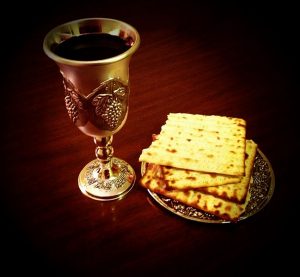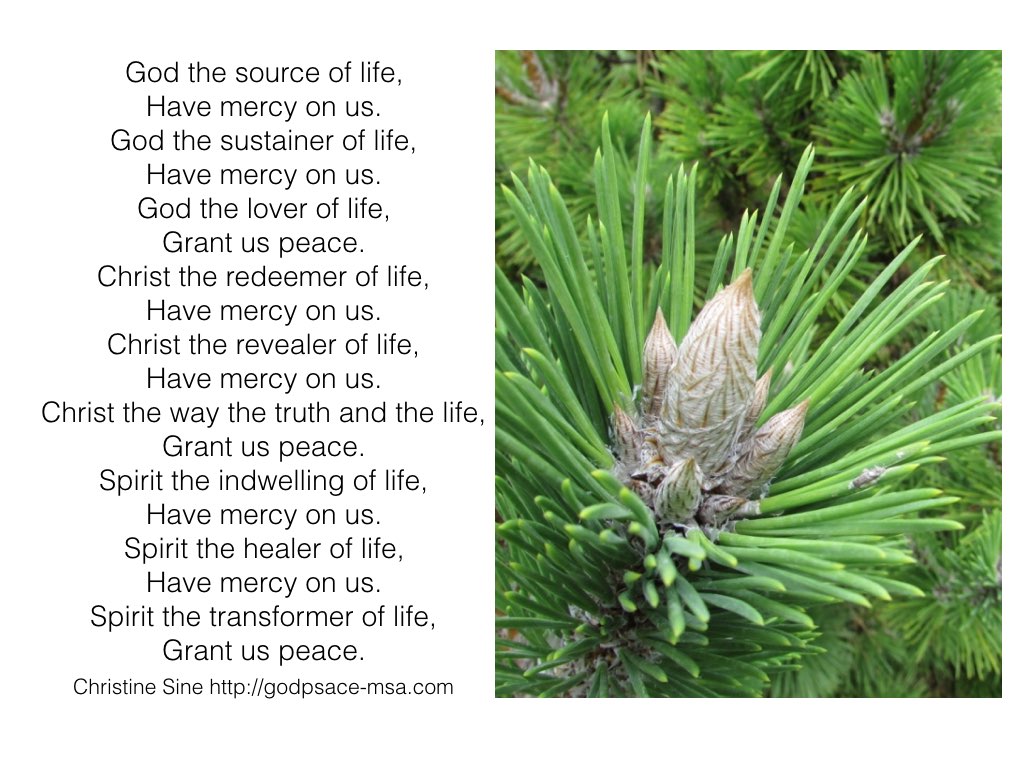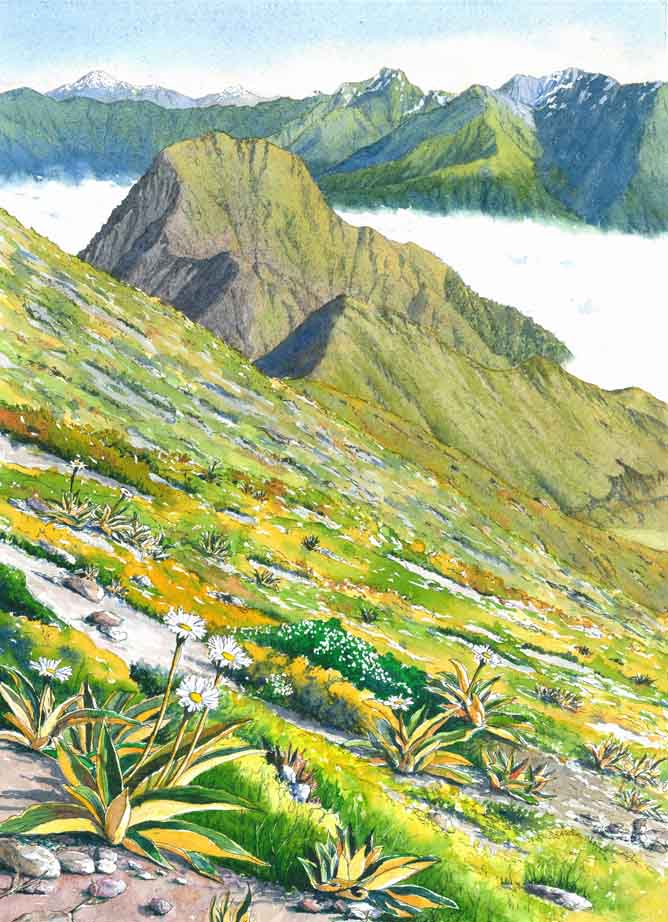I’ve never been a big fan of Chaos Theory. When people try to explain that a butterfly flapping its wings on one side of the world could cause a hurricane on the other, my common sense chip goes into overdrive and steam starts coming out of my ears. But if you tell me that thousands of people’s life or death can be ruled over by one tiny insect, then you have my attention. Because I know this to be true. One mosquito bite, in so many countries in the world, can pass on the disease malaria, meaning agonising periods of illness, sickness and fever spread over years, and even, especially in young children, death. Sadly, the charity Christian Aid estimates that one child dies every 60 seconds from malaria.
We know too that human enemies include the tsetse fly which carries yellow fever (also deadly to cattle) and that mosquitoes pass on dengue fever as well as malaria. If we are tucked up safely in our northern hemisphere, we are likely to feel at ease about such risks. It’s another one of those things that we imagine only happens in Africa, and we feel sorry about it, but having seen the cases featured on Comic Relief time after time, we imagine too that throwing more and more money at the problem doesn’t seem to help – I admit, I have felt this too. But our apparent safety from the world of insects is illusory, and our apathy misplaced. If you have friends with chronic illnesses, as I do, you have more than likely come across Lyme disease, passed on through tick bites, often picked up via a leisurely stroll in the woods. The effects, especially if the disease is not quickly treated, can be severe, long term and debilitating.
So how about some solidarity with those who suffer simply because of where they were born, or into a specific level of poverty, or because an infected insect happened to bite them, who knows why? Paul tells us, “From one man he made all the nations, that they should inhabit the whole earth; and he marked out their appointed times in history and the boundaries of their lands.” (Acts 17:26) and we might well take this to mean that the Lord is in charge of where we live our lives. I believe that is true, and I trust the Lord has plans that cover absolutely every last thing, and that he is a master of bringing order from chaos, brooding over the waters of our lives. But I don’t believe we serve the Living God by being fatalists. I believe that a lot of poverty is human-made, that because of free will we can wickedly flap the wings of our apathy and fail to relieve the suffering of our tiny brothers and sisters seemingly so far away. And I am preaching as much to myself in writing this piece, as I am expressing a longing that we might wake up to the impact we can have on the world if we truly want to be salt and light. I guess that is what the New Changemakers movement that we are talking about this month is all about, and I want to be a part of that, in however small a way I can. Even if the air around my wings barely moves, perhaps if I join a swarm of butterflies, that cumulative movement might truly cause a storm of righteousness.
If you would like to make a donation to Christian Aid’s Malaria program, you can do so here. Thank you.
by Christine Sine
The real voyage of discovery consists not in seeing new landscapes but in having new eyes. Marcel Proust
Over the last few weeks Tom and I have had a steady stream of visitors. First Tom’s niece visited from New York, then my nephew from Australia. We only had a couple of days of respite before friends arrived from Australia, New Zealand and Canada to join the celebrations revolving around the launch of Tom’s new book Live Like You Give a Damn. We laughed together, prayed together and celebrated life together, renewing our friendships and strengthening our faith.
I love this richly diverse global culture of which I am a part and learn so much from my interactions with those around me.
We all need community. Tom and I live in a small intentional community in Seattle. We inhabit the middle floor of a triplex with a family in the apartment above and three singles in the basement apartment below. We share meals at least once a week, and garden together once a month. We love hospitality and enjoy entertaining guests from around the world.
Friends, family and even strangers root me more deeply into my faith, stretch my boundaries and help me to grapple with life’s challenges. They help me to see life, God’s world and my faith with fresh eyes
What is your response?
Sit quietly for a few minutes and think about God’s wonderfully diverse global community of which you are a part. Remind yourself of the friends and family who form your community. Now think about people of other cultures and faiths who have impacted your life. Thank God for the richness of your faith that has grown through the witness of others. What opportunities continue to provide meaningful interaction not just with friends but also with people of other faiths and cultures?
Early Christians believed that God comes to us in community—Father, Son, and Holy Spirit—a perfect harmony of relationship. They reasoned that since the essential nature of God is love, and because it is impossible to practice love in isolation, God the Trinity must be a model of perfect community. To become a disciple meant to be drawn into this community of mutual love and perfect relationship—not alone, but as part of God’s family with sisters and brothers from every tribe and nation, with the rich and the poor, the young and the old, the sick, the lonely, the disabled, the homeless, the marginalized, and the abandoned.
I grew up in a diversity of cultures. My father was Greek, my mother Scottish, my country Australia. As a young doctor, I moved to New Zealand and then to the mercy ship Anastasis and finally after Tom and I were married, settled in Seattle in the U.S.
My faith has been shaped, reshaped and renewed by the diversity of my friends and colleagues. And I don’t even need to travel or have others come to visit to experience this diversity. It is all around me. Our local community is richly diverse. There is a Muslim mosque less than a mile away, homeless people on our corners, retirement communities and yuppy villages.
All of these cultures provide rich learning experiences. But sometimes that journey across the street is harder than the one around the world. I make time for our international visitors but find it harder to take time for my neighbours. I am not always ready to have my mind stretched and my horizons broadened.
What is your response?
Sit and think about the phrase “God comes to us in community”. Repeat it several times. Watch the video below then close your eyes and sit in silence for a few minutes. What images come to mind? In what ways do your friendships reflect God’s community? What steps might God be prompting you to take to enrich that experience?
“Faith is stepping out on nothing and landing on something.” – Cornel West
I’m a Christian pastor starting a farm that grows people, along with good food. Two years ago, my food and faith hero, the founder of Hazon and the catalyst for the Jewish movement, Nigel Savage said this:
“I went into Google this afternoon, and in quote marks… I typed ‘Christian Food Movement,’ and there were two hits. I typed ‘Jewish Food Movement,’ and there were 81,300 hits.”
When I read Nigel’s words, I got frustrated. I knew that there actually was a Christian food movement – there were seminaries and researchers and bloggers and different sectors in the Christian world working at the intersection of faith and food.
And Nigel was right – this movement was invisible. Many people were doing good work, but there was no common platform that brought people together to pray for one another, offer resources and help, and catalyze a larger conversation.
When I started looking for it, the Christian food movement was huge. The list is incomplete, and still there are four international organizations, fourteen national organizations, dozens of regional organizations with ministry focused on the area of food, faith, and sustainable agriculture. There are farms and gardens with a specific Christian faith component – farms which teach care of Creation, farms which exist to feed the hungry.
Different denominations have published resources specific to their faith tradition. There are farm, garden and dinner churches. Women’s religious orders are serving as hubs for sustainability. Seminaries are putting gardens on their campuses, developing creation care certificates, and developing farm-based learning programs. Christian curricula on food systems issues have been published by individuals and denominations for every age range. And recently there has been a veritable explosion of published literature: Farming as Spiritual Discipline. Making Peace with the Land. Bread and Wine. Faith in Food. Baptized with the Soil.
I gathered it all together and in March of 2015 I put out the first version of a resource guide now titled Welcome to the Christian Food Movement. It has everything I could find that fits at the intersection of food, faith, and sustainable agriculture. It’s 27 free pages of links and descriptions.
For more than a decade, I’ve felt called to start a farm as ministry. Before I started this work I thought I was crazy and alone. After I published the first version I realized I was neither. I don’t aim to define or organize a Christian food movement. I created the guide because I didn’t want to feel crazy and alone anymore. What I didn’t expect was that it would draw me into conversation with so many people who work at this intersection: whose work inspires me.
There is radical risk-taking on the part of these Christian food movement pioneers, the kind of risk-taking that comes when you know you are stepping out on nothing and yet you keep landing on something. And there is a sense that no matter how hard the work is – and let me tell you, stepping out on nothing every day is hard work – it is necessary. It is necessary for the glorification of God by the disciples of Jesus Christ, in whom all things were made and through whom all things are being made new.
Why do we need a Christian food movement?
Today, within church buildings, the book of Genesis is read, proclaiming that human beings are of one substance with the dust of the earth. But most faithful Christians don’t have any idea that chemical fertilizer applied to monoculture lawns contributes to the decline of soil tilth. They believe God made the soil, and they believe they should tend it, but the church hasn’t taught them how to do so – the fertilizer company has.
Within church buildings, certified kitchens go unused. Outside, secular organizations wonder how to find a kitchen to redevelop a local living economy with a sustainable foodshed. Because many churches don’t realize that their certified kitchen could be part of their ministry in the community.
We live in an era of climate change when churches own thousands of acres of land but have never heard of carbon farming.
Young people who want to go into sustainable agriculture get stuck because they can’t figure out how to access land and capital. And churches with land and capital get stuck because they don’t have young people.
For all these reasons and more, I’ve come to see this Christian food movement as a sleeping giant – a potential for change at an unprecedented scale for both the church and the country at large.
I’ve also come to see a Christian food movement as a natural outgrowth of our faith. Because when Christ was getting ready to lay down his life for our salvation, he didn’t build a building and he didn’t install a bureaucracy. He invited his friends – and his mortal enemy – to a meal. Not just any meal, but a Passover feast, a feast of liberation from slavery, a feast in celebration of the Creator of the Universe’s claim on his people. And he asked us to eat and drink in remembrance of him. Our Lord promised to be present with us through a meal.
As we celebrate Earth Day, I remember that first Communion meal. I remember the Grace of God in Creation and the beauty of the earth from which all meals come. And I pray for a Christian food movement that brings together diverse people to share in holy food and tend a holy earth. I pray this Earth Day, that together, we will step out on nothing – and land on something.
(Want the Christian food movement guide? You can get the latest version here.)
When I use the term “Community of Creation” I mean it in a very literal sense. Did you know that in just one cup of undisturbed native soil there exists 200 billion Bacteria, 20 million Protozoa, 100,000 meters of Fungi, 100,000 Nematodes and 50,000 Arthropods? The earth is alive, moving, breathing, and in relationship with each of us and with all other life. In that one cup of dirt exists a living community that creates a healthy environment to nurture and establish a simple seed.
Perhaps the Apostle Paul had an inkling of this community life when he wrote: Christ is the visible image of the invisible God. He existed before anything was created and is supreme over all creation, for through him God created everything in the heavenly realms and on earth. He made the things we can see and the things we can’t see…He existed before anything else, and he holds all creation together. Col. 1:16, 17
I’ve always been told by elders and spiritual leaders in my tribe that our duty is to maintain that balance between earth and heaven. When something gets out of harmony, it is the job of human beings to take action; to hold ceremony; to reconcile the problem, in order to bring it back into harmony. I think that is one of the ways how our Creator “holds all creation together.” We are Creator’s hands and feet. We are the planters and co-sustainers of this shared garden we call planet earth.
When harmony is sought, good things happen. With the healing of the earth comes the outcome of abundance. With abundance comes the opportunity to share. With sharing comes friendship, knowledge, experience and community. Our own healing is intricately tied to restoring the earth.
As an integral part of the living Community of Creation we cannot afford to sit back idly when there is so much effort being put into disrupting the natural harmony cycles that keep the planet operating as it should.
- Topsoil is disappearing…
- Water supplies are in crisis
- Forests are shrinking…
- Desertification is advancing…
- Coral reefs are dying…
- Green House gases are increasing…
- Farmable land is shriveling
- Plants, Fish, Insects, Birds, and Animal species are going extinct…
The victim of human anthropocentrism is the earth. The culprit is humanity…the answer is harmony. All the rest of creation attempts to work together towards a harmonious reciprocity, except humans. Our own bodies are a system of proteins molecules, minerals, plasma, water, organs, bacteria, etc. put together in a cellular structure that works together in reciprocity to keep us functioning in good health. When one of our cells begins to work independently of everything else, we call it cancer. In this sense, human beings have become the “cancer” of the earth. But, unlike some forms of malignant cancers, our healing is in our own hands and it is our choice.
Some time ago my wife Edith and I sought to understand the gravity of the present situation. As a result, we began to change our normal American consumer lifestyle. We recycled; we made compost; we changed to compact florescent bulbs; we showed up to protest such things as mountaintop removal; signed petitions against genetically engineered food; demanded proper food labeling; educated ourselves and voted for people and issues concerned about the earth crisis. But we also started farming. And not just a farm, but a regenerative oriented teaching-farm where we could create a model for inspiration regardless of whether they had access to many acres in the country or just a window sill in the city. Our farm exists on three foundational and related spheres of thought:
- Traditional Indigenous Knowledge
- Regenerative Permaculture
- Biomimicry
While I’d love to go into the value of each of these areas, my time and my word limit is fast approaching, (besides, you can google them). In everything we have done as a ministry, a farm, a school and a community, over the past 25+ years, I’m beginning to believe that our decision this year to become “keepers of seeds” is perhaps the most important. Why? As a planet we are losing the seeds of the earth and their loss brings a whole multitude of other losses in terms of related plants, insects, birds and animals. Once they are gone, these varieties and strains will be gone forever. Within the seeds are the DNA of the world we and our ancestors have known. The seeds are the key, and the enemy knows it!
Multi-national corporations are raiding ancient, sometimes thousands of years old, seeds and heritage seeds, then they put their own patent on them. These large, multi-national corporate pirates create Genetically Engineered “Frankenseeds” that respond only to their insecticides and herbicides, cornering the market, then they sue the people who continue to plant the same original seeds they have used successfully for centuries to feed their families. The Genetically Engineered crops speed up the destructive process of the land by completely altering the composition of soil bacteria where they are grown. In addition, when farmers spray glyphosate and other chemical products produced by these companies on their fields, not only are they destroying the fertility of the soil, they’re also promoting chemical resistance in the field and aiding antibiotic resistance in the human food chain.
We are also loosing seeds by attrition. Farmers and farm land is rapidly disappearing. America looses 50 acres of farm and ranch land per hour and in 30 years from now it will require twice the land to feed the world’s population. Also, many seeds get lost over time, i.e., “Aunt Mary’s” heritage seeds don’t get planted after preserving them for generations because her descendants moved to the city. Then there are hybrids. Hybrids may help some areas of specificity but they cannot reproduce the same strengths found in the original seed with any predictability. Sadly, we have already lost 75% of the world’s crop varieties over the last century. The incredible story of the pure seed struggling for a right to exist capsulizes the problem. Original, ancient, non-GMO, open-pollinated, heritage and ancient Indigenous seeds are the answer. Plant some soon.
To find out more about our spirituality go to: Eagles Wings Ministry
To learn more about our farm, school, community, Eloheh Farm Eloheh Farm – FB (Facebook Page)
To discover good seeds or to order seeds go to: Eloheh Seeds.
 Randy Woodley, a distinguished lecturer, teacher and wisdom keeper addresses a variety of issues concerning American culture, faith, our relationship with the earth and Indigenous realities. His expertise has been sought in national venues as diverse as The Huffington Post, Moody Radio and Time Magazine. Randy was raised near Detroit, Michigan and he is a legal descendent of the United Keetoowah Band of Cherokee Indians in Oklahoma. He has been involved in mentoring Indigenous leaders for almost three decades. Randy, with his wife Edith, is a cofounder of Eagle’s Wings Ministry and they are considered early missiological innovators in the Native American Cultural Contextual Movement. He and Edith, (Eastern Shoshone) maintain Eloheh Farm and Eloheh Village for Indigenous Leadership Development, a permaculture, regenerative teaching farm, school and community in Newberg, Oregon. Randy is also the founder of CHCHEW (“chikoo”) The Coalition for Healing Chinook-Kalapuya Earth and Water.
Randy Woodley, a distinguished lecturer, teacher and wisdom keeper addresses a variety of issues concerning American culture, faith, our relationship with the earth and Indigenous realities. His expertise has been sought in national venues as diverse as The Huffington Post, Moody Radio and Time Magazine. Randy was raised near Detroit, Michigan and he is a legal descendent of the United Keetoowah Band of Cherokee Indians in Oklahoma. He has been involved in mentoring Indigenous leaders for almost three decades. Randy, with his wife Edith, is a cofounder of Eagle’s Wings Ministry and they are considered early missiological innovators in the Native American Cultural Contextual Movement. He and Edith, (Eastern Shoshone) maintain Eloheh Farm and Eloheh Village for Indigenous Leadership Development, a permaculture, regenerative teaching farm, school and community in Newberg, Oregon. Randy is also the founder of CHCHEW (“chikoo”) The Coalition for Healing Chinook-Kalapuya Earth and Water.
By Andy Wade –
Earth Day is gaining ground among Christians and, well, it’s about time! The theology surrounding our need to care for God’s good creation is as deep as our topsoil used to be, and as rich as the fertile earth that gave birth to the Garden of Eden.
There are a lot of big ideas out there about what we can do to celebrate this day, ideas about how to get involved in the grand movements we need to pull our world back from the brink of self-destruction. Please don’t neglect the big picture! But as I reflected on this, and having just returned from the Inhabit Conference which is all about localizing our faith, I wondered what it would look like to make a list of Earth Day practices for the neighborhood.
Here’s a short list of what I came up with – please share your ideas in the comments section below. This list begins with the things I’ve done (1-5) and moves toward the things I hope to put into practice by the end of the year (6-10) – remember, stewarding God’s creation is a lifestyle, not a one-off event.
-
Create a front yard that invites community to enter, rest, and talk. How do we recognize and tear down natural and physical barriers to community and conversation? (See my “What If?” video at the bottom).
-
 Community Sun Tea and Herb Garden. This might be in your own yard or in some community space. Plant mints, lemon balm, and various flowers that tea can be made from and put instructions how to use them in your Little Free Library. Plant a variety of popular herbs like basil, rosemary, thyme, oregano, sage, and others. Have a neighborhood party to explain what you’re doing so the neighbors feel comfortable coming into your yard to harvest these gifts – then ask them what they’d like added to the space!
Community Sun Tea and Herb Garden. This might be in your own yard or in some community space. Plant mints, lemon balm, and various flowers that tea can be made from and put instructions how to use them in your Little Free Library. Plant a variety of popular herbs like basil, rosemary, thyme, oregano, sage, and others. Have a neighborhood party to explain what you’re doing so the neighbors feel comfortable coming into your yard to harvest these gifts – then ask them what they’d like added to the space! -
 Build a Little Free Library… and make sure there are some good garden and earth keeping resources in it! Again, this might be in your front yard or a community space. Even better, follow the model of the Lents District in Portland, OR and instigate a neighborhood Free Little Library revolution!
Build a Little Free Library… and make sure there are some good garden and earth keeping resources in it! Again, this might be in your front yard or a community space. Even better, follow the model of the Lents District in Portland, OR and instigate a neighborhood Free Little Library revolution! -
Build a Little Free Nursery. This is an idea I came up with this spring as I looked at all the plants in my garden that needed dividing, all the volunteer plants, and the over productivity of my green house seed starts.
-
Create a neighborhood orchard! Most of us don’t have room to plant a variety of trees and fruit bushes. Our yard is a pretty typical postage stamp space so we had to get creative. A couple of years ago we purchased two espalier apple trees with your neighbor and planted them on the boundary line. Six varieties of apples on one tree! But then I remembered that our other neighbor shares cherries from their trees and another Italian plums! What it we got together and intentionally planned what trees each would grow and how to share the abundance?
-
Organize a Little Free Seed Library. There are lots of ways to do this. Most of us that garden buy our seeds and end up with way more than we really need. What if we took the extras and shared them with our neighbors? My next step on this adventure is to get serious about seed saving – the intentional gathering of seed from my organic and heirloom plants to save for next year – there’s a hidden abundance to share but we’ve been taught that we have to buy seeds every year!
-
Create a community Tool shed. We already do a pretty good job of sharing tools with our close neighbors, but how about building a whole neighborhood tool library! I was sharing this idea, which I knew wasn’t original, with Brandon Rhodes of the Springwater Community and he told me his Lents neighborhood (yup, the same one I mentioned in the Free Little Library section) has a very efficient model already going! Here’s how it works in Lents district, PDX and here are a couple of other how to guides:
-
Organize a Neighborhood Farmer’s Market Party.
-
Get your neighbors together and carpool to your local farmers market. Find out if there are bulk items you can purchase together. Most markets also offer a festive atmosphere with great food to eat so plan to party with your neighbors at the market!
-
Organize your own little backyard farmer’s market. One year we had more tomatoes than we knew what to do with but our cucumbers were dismal. Strangely enough our neighbors just two houses down had just the opposite problem! We would never have know if we didn’t talk to our neighbors. Neighborliness creates an abundant community!
-
-
Organize a Toxic Block Party! This is an idea that came to me just a couple of weeks ago. What if we gathered interested neighbors together to purchase in bulk supplies needed to make earth and human friendly household cleaners? There are a whole lot of recipes and ideas out there but it’s even better together! Don’t stop there, use this party as an opportunity for your neighbors to bring all their toxic cleaners to your house for recycling at the next hazardous waste recycling event at your local dump? You could even take this a step further by inviting your neighbors to a “create your own earth friendly cleaning supplies” event. Most of the store bought cleaning supplies can easily be created with just a few natural ingredients. Here are some DIY non-toxic recipes you can explore.
-
Create a neighborhood bee, butterfly, and beneficial insects sanctuary. Bring your neighbors together to talk about the effects of lawn weed & feed, herbicides like Roundup, and plants purchased from nurseries that use known toxins that kill beneficials. How can you work together to create a whole block of yards where bees, butterflies and beneficials can reproduce and thrive? This discussion should include what not to use on the garden/lawn but also what plants and habitats actually encourage a healthy environment.
This day is a celebration and a day of repentance as Rebecca Joy Sumner captures so well in her prayer for today which closes:
And on this day we mark to remember the land and all that lives in and on it, give us a seeming impossible cocktail of repentance, your undeserved absolution, good work to do with our hands, and rapturing wonder and joy in the beauty of this earth you have given to us and us to.
What are your ideas for localizing Earth Day in your neighborhood? Some of these ideas are great for people with houses but what if you live in an apartment? How would you live into Earth Day there? And how might we all move from Earth Day to the kind of stewardship that makes everyday a day we celebrate God’s amazing creation in ways that sustain and bring forth life?
- What does it mean to practice presence in your neighborhood?
- How do you cultivate place, community, right where you live?
By Lynne Baab
Sometimes we fall into the error of thinking that the notion of caring for God’s creation is something new, unique to our age. Psalm 104, which dates back well over 2,000 years and maybe a millennium more, expresses tenderness about the beautiful world God made, and shows God’s intimate involvement in it. John Stott called Psalm 104 one of the earliest ecological documents we have and C. S. Lewis referred to the writer of Psalm 104’s “gusto for nature.” Here are some selected verses from the Psalm. If these verses are true, how can we not take care of this precious world created and sustained by God?
Bless the Lord, O my soul.
O Lord my God, you are very great. . . .
You set the earth on its foundations,
so that it shall never be shaken. . . .
You make springs gush forth in the valleys;
they flow between the hills,
giving drink to every wild animal;
the wild asses quench their thirst.
By the streams the birds of the air have their habitation;
they sing among the branches.
From your lofty abode you water the mountains;
the earth is satisfied with the fruit of your work.
You cause the grass to grow for the cattle,
and plants for people to use,
to bring forth food from the earth. . . .
O Lord, how manifold are your works!
In wisdom you have made them all;
the earth is full of your creatures.
These all look to you
to give them their food in due season;
when you give to them, they gather it up;
when you open your hand, they are filled with good things.
When you hide your face, they are dismayed;
when you take away their breath, they die
and return to their dust.
When you send forth your spirit, they are created;
and you renew the face of the ground.
(Psalm 104: 1, 5, 10-14, 24-30, NRSV)
And here’s part of a poem, Auguries of Innocence, by William Blake (1757-1827) which expresses the rage and concern in heaven when God’s creation is violated. I love the passion in these words:
A robin redbreast in a cage
Puts all Heaven in a rage . . .
A dog starved at his master’s gate
Predicts the ruin of the State.
A horse misused upon the road
Calls to Heaven for human blood
Each outcry from the hunted hare
A fibre from the brain does tear.
A skylark wounded in the wing,
A cherubim does cease to sing.
Here are some suggestions for Earth Day, April 22 this year, and the week that follows:
- Each day this week find something in nature that you enjoy, and spend some time praising God for it.
- Ponder the ways you care for God’s creation, and commit those actions to God in prayer.
- Ask God to help you figure out one more way you might manifest your concern for the creation, one more action you might do consistently.
As an Amazon Associate, I receive a small amount for purchases made through appropriate links.
Thank you for supporting Godspace in this way.
When referencing or quoting Godspace Light, please be sure to include the Author (Christine Sine unless otherwise noted), the Title of the article or resource, the Source link where appropriate, and ©Godspacelight.com. Thank you!


